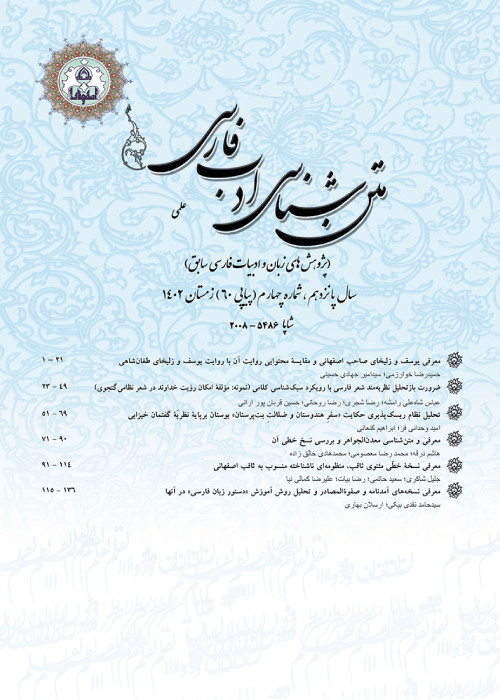“You Kept Killing to Let No Valiant survive”Critique of the Ideas and Practices of Editors in the Restoration of Two Verses Attributed to Roodaki Samarqandi in Persian Rhetorical Sources
Rudaki Samarqandi is a master and pioneer of Persian-speaking poets of post-Islamic Iran. Rudaki's name and reputation in the court of the Samanids and the visible and nonvisible wisdom in his poetry, especially the adequate words and easy meanings of his poems, have made this long-standing poet a particularly special image in the minds of Iranians as well as Persian speakers outside Iran. The present library study is based on two verses attributed to Rudaki. One verse in Tarjoman al-Balagha, Hadayegh al-Sehr and other rhetorical sources is documented as “You killed so that no one would be brave/ You gave so that no one would be poor” [hami bekoshti ta adami namand shojaa/ hami bedadi ta adami namand faqir] and the other verse in al-Mo’jam is written as “hami bekoshti ta dar adou namand shojaa/ hami bedadi ta dar vali namand faqir”. Among the editors of Rudaki's poems, Bahar and Nafisi believe that the first verse is a wrong narration or recording of the second verse. For this reason, and following these two correctors, the first verse is not included in any of Rudaki's poetry collections, but evidence shows that these two poems are not one verse. Rather, the two verses are independent of each other. In the present study, first of all, by considering the existence of similar verses in the works of poets, we show the independence of the verses. Then, by considering the stylistic features of Rudaki's certain poems, we show the authenticity of the first verse. Finally, we talk about some probabilities of the second verse. Introduction Today, Rudaki's poetry is an important part of the cultural identity and heritage of the ancient Persian speakers across the world. In Iran, Tajikistan, Russia, Germany, etc., some correctors have attempted to correct and publish the existing poems of this poet. But, to date, no ordered piece of his poems has been obtained. On the other hand, the deletions occurred over time and the small amount of the remaining poems did not give enough chance to correctors to examine the poet's stylistic and linguistic subtleties. For this reason, in some cases, correctors have corrected verses using conjecture. For this reason, some problems are observed in recording and correcting some verses of Rudaki's printed Divans. In Tarjoman al-balagha, Hadayegh al-Sehr, Badaye al-Sanaye, and Madarej al-Balaqa, the following verse attributed to Rudaki could be seen: “You killed so that there were not a brave/ You gave so that there were not a poor” [hami bekoshti ta adami namand shojaa/ hami bekoshti ta adami namand faqir]. This verse is mentioned in the aforementioned sources in the "al-Ebdaa" section. The other verse which is mentioned only in Shams Gheys Razi’s al-Mo'jam and is very close to the following verse: “You killed so that there will not be brave in the enemy/ You gave so that there will not be poor in Vali” [hami bekoshti ta dar adou namand shojaa/ hami bekoshti ta dar vali namand faqir]. The great formal and content similarity of these two verses has forced the correctors of Rudaki's Divan (Nafisi and Bahar) to judge the choice of a verse from the two mentioned verses. In the present study, the authors examine the two verses by examining the issues of stylistics and the structure of Khorasani style poems and make judgments about the opinions of the correctors. Materials and Methods The present study is a library study, based on data analysis. The authors, using documentary sources of Rudaki poems, manuscripts of these sources including Persian rhetorical texts and Persian to Persian lexicon, etc., as well as examining the published divans in Iran and Tajikistan analyze two verses of Rudaki’s poems and criticize the correctors' opinions based on scientific and stylistic issues. Discussion of Results and Conclusions In the present study, the authors examined two verses of Rudaki Samarghandi's hymns. The correctors have considered these two verses as one verse in their corrections in terms of form and content similarity, with two different recordings. After a detailed study of these two verses, we were able to achieve the following results: In contrast with the correctors’ opinion, these verses are not one verse with two different forms; rather, they are the same verses with two different recordings. For textual reasons, one of the verses cannot be considered as a different narration or recording of the other verse. The first verse, contrary to the opinion of the correctors, is a correct and original verse in accordance with the definite stylistic features of Rudaki's poems. Therefore, it is not right to remove it from all the divans of Rudaki's poetry. The second verse is independent of the first verse. The theme of this verse is a common theme among the remaining poems of Khorasani style poets and beyond. The second verse can also be considered as an independent verse from the first verse in Rudaki's scattered verses. These possibilities include the manipulation of scribers, manipulation of the author, imitating Rudaki’s poetry, etc. but until a definite document is found, the possibility of being attributed to Rudaki is more than other possibilities.
Rudaki , Divan of Rudaki , Nafisi , Edit , rhetorical sources , content
- حق عضویت دریافتی صرف حمایت از نشریات عضو و نگهداری، تکمیل و توسعه مگیران میشود.
- پرداخت حق اشتراک و دانلود مقالات اجازه بازنشر آن در سایر رسانههای چاپی و دیجیتال را به کاربر نمیدهد.



